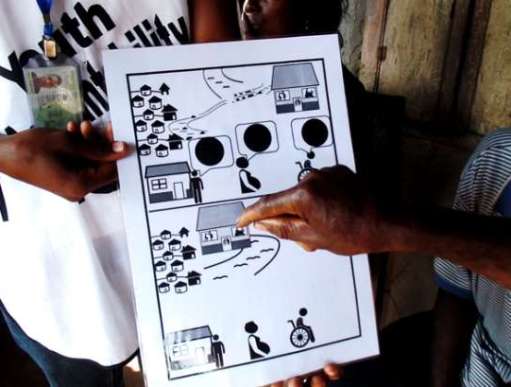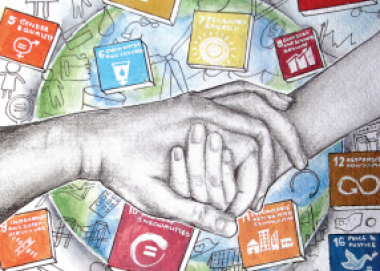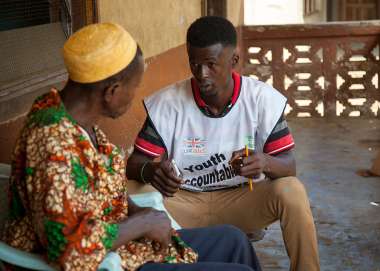After almost 20 years without a suitable health centre, a community in the Western Rural District of Sierra Leone has been redoubling its efforts to work with the local government to kickstart discussions around the building of a vital new facility.
Gbendembu community, near Port Loko, was hit hard by the Ebola outbreak in 2014. But since Gbendembu was chosen as an initial SABI target community, people there have been engaging with local leaders to highlight the urgent need for a health centre and develop an action plan.
Community-led accountability
In Gbendembu, SABI uncovered the need for an improved health facility. It found a growing population in the ward had put a strain on health services. SABI created space for community people to once again voice their concerns, creating a sense of ownership.
The council took up the challenge and contacted the district health medical team (DHMT). The DHMT found the community had an abandoned market building which could be converted into a health centre. It was working closely with the council to secure the required funds through local non-governmental organisations to kickstart the construction of the centre.There is optimism that the community will have a health centre before the end of SABI programme.
SABI works in 610 communities in Sierra Leone, strengthening citizens’ voices, improving accountability and building a strong relationship between citizens and state.
Surrounded by rocky hills, forests and with very poor roads, Bafodia, in Koinadagu district, is a remote community in northern Sierra Leone.
The challenges of providing quality local healthcare
The CHC has also struggled to provide free drugs to those who need them. Community members have had no choice but to buy poor quality, sometimes expired, medicines from informal drug sellers.
Low levels of literacy have also been a serious challenge in this community of around 5000 people – made up mostly of children, young people, women and elderly people – hindering the community in seeking and securing development packages from the district councils or central government. They have often missed out because the community is simply too hard to reach.
SABI and its partner Sierra Leone Social Aid Volunteers (SLSAV) has worked with people in Bafodia to address some of these challenges.
The community highlighted challenges around healthcare, also raising the long distances some families had to travel to the CHC and reporting that the centre had been closed for four weeks, when a nurse was off sick.
Following the sessions, the community – alongside the SLSAV team and a local ward councillor –brought these key issues to the attention of the district health authorities, who promised to send an additional nurse to ensure the CHC operates properly.
The ward councillor and community members worked together to support CHC staff to ensure the facility is constantly staffed and drugs don’t run out.
SABI’s Inatorma Coomber said: ‘Citizens’ knowledge has increased on how to demand services and who to engage to improve service delivery.’
SABI has raised community awareness of their roles and responsibilities and how they can take action to make district authorities listen and respond to their needs. It also raises citizens’ awareness of key government policies and procedures, relating to healthcare in their communities, so that they can hold effective and ongoing dialogue with better engaged, and more accountable state service providers.
The power of data
Another essential component of the SABI programme to date has been gathering evidence of Sierra Leoneans’ experiences on health and other services through a countrywide citizen perception survey (CPS).
In 2018, CPS data was gathered countrywide with a survey that reached 29,923 respondents, including pregnant women and new mothers, Ebola survivors and health workers. Last year, 45,000 people were surveyed.
To fully engage duty bearers and citizens to inspire action, SABI transforms the data into low literate infographics and presents evidence at community and district level. Using low-literate infographics makes it easy for community people to visualise their responses and validate the findings. This includes showing images that explains the data obtained from their community.

Community people then work with their local leaders to develop action plans that help to bring change in the way healthcare services are delivered.
SABI also conducts district and national summits as an innovative approach to giving citizens a voice and stimulating a national conversation around health and the programme’s other key themes.
To read more about what we do and how we do it, please go to www.sabi-sl.org
To access our citizen’s perception data, please go to http://sabi-sl.org/community-data/



